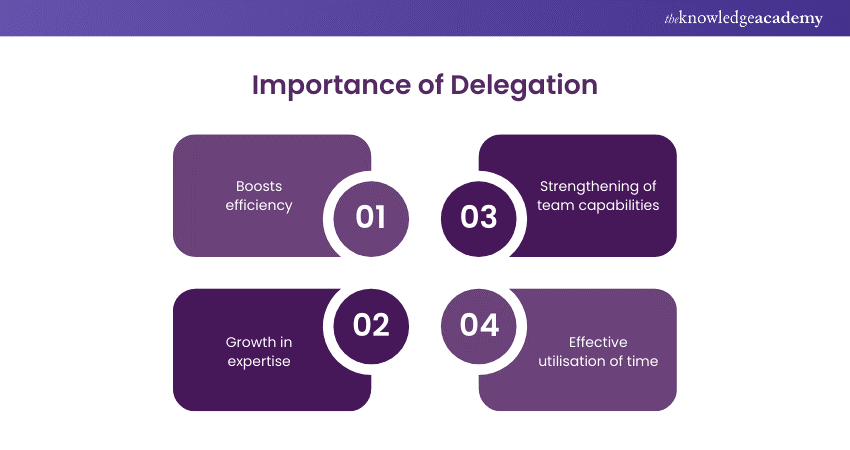We may not have the course you’re looking for. If you enquire or give us a call on +44 1344 203 999 and speak to our training experts, we may still be able to help with your training requirements.
Training Outcomes Within Your Budget!
We ensure quality, budget-alignment, and timely delivery by our expert instructors.

Delegation is a supervisory technique at the managerial level that includes assigning duties from a higher rank to a lower rank worker who then fulfils a particular task or a project. The process also allows the managers to delegate and oversee the tasks correctly, increase staff efficiency and inspire a feeling of trust and confidence among the workforce. This blog will help you understand What is Delegation and use it as a way to increase team performance or productivity.
Table of Contents
1) What is Delegation?
2) Components of Delegation
3) Importance of Delegation
4) Characteristics of successful Delegation
5) Strategies for successful Delegation
6) Conclusion
What is Delegation?
Delegation is an important management technique that includes efficiently utilising time and resources and encouraging the development of trust and the growth of different sets of skills within a team. Through this process, managers can focus on prioritising tasks and distributing work equally among team members. With the help of proper Delegation, objectives are clearly understood, resources are utilised and divided equally, and organisational productivity and employee satisfaction are increased.
Components of Delegation
Delegation is a crucial management practice that involves three critical components. Every leader must know these dimensions because if they are not implemented, teams will not achieve success. Let’s discuss more about these components:
1) Responsibility
Responsibilities mean expected duties of the individual when they are allocated to do a specific task or job. The Delegate's responsibility is to carry out a given task by applying their skills and power of will. They are responsible for meeting the standards and deadlines upon receiving an assignment.
2) Authority
In this case, the role of an authority is to give the manager the power and the right to make decisions and take actions that may enable the work to be done. Here, the delegates are offered permission to carry on with different organisational resources, make decisions, and take actions that are in harmony with the goals of the project or task. A person having the required authority may do to his responsibility in a good way.
3) Accountability
Accountability means the Delegate should take responsibility, follow the chosen plan, and report on the results. This process implies that the task to be given out is reviewed through the outcomes, and the person (the one to whom you have delegated the job) is responsible for producing the desired results. Accountability comprises a clear notion that after the delegated tasks, the original delegator will hold the most crucial liability, either success or failure.
Learn Leadership skills with our Leadership Courses today – register now!
Importance of Delegation
To know how Delegation plays an important role in the organisation, let's look at these points to understand its importance:

1) Boosts efficiency
Delegation means tasks can be assigned to team members based on their skills and knowledge to achieve the best results. Because of this, jobs get done faster, and there is higher-quality output, which boosts the productivity of the whole organisation.
2) Growth in expertise
By assigning tasks, leaders let the team members take on new responsibilities and work on assignments that usually fall outside their responsibilities. This experience shapes their expertise, creating a culture of learning and growth within the organisation.
3) Strengthening of team capabilities
Effective Delegation will instil a sense of responsibility and accountability among the team members. It will help them use their judgement and make decisions regarding their assigned tasks, increasing their work capabilities and encouraging teamwork and harmony.
4) Effective utilisation of time
Delegation liberates the leader's time to concentrate on more vital aspects of planning, decision-making, and financial performance. It guarantees that the head of the office can efficiently execute those activities that the team members can perform, thereby realising higher productivity.
Do you want to learn how to supervise your team efficiently? Register now for our Introduction to Supervising a Team Training!
Characteristics of successful Delegation
Let's discuss some essential characteristics of successful Delegation:
It is purposeful
Effective Delegation is deliberate and focuses on objectives to reach different goals for a particular purpose. The objectives behind Delegation should harmonise with the organisation's mission, the strengths of individuals and the developmental needs, making it possible to assign a specific task only for increased efficiency and success.
It concentrates on results
A good Delegation stands on results instead of how they are reached to develop creative approaches to problem-solving and meet the end goal. By being goal-oriented and providing a framework for completion, including anticipated outcomes, you give others the space to execute work innovatively using initiative and creativity. Even the task-focused strategy guarantees that if well distributed, the assigned goals remain relevant to the team's or organisation's overall objectives; hence, performance and productivity will be enhanced.
It offers opportunities for growth
One factor that makes good Delegation an even better approach is its chances for career development. This enables employees to achieve their career objectives and enables organisations to gain through a more equipped and versatile workforce. Successful Delegation induces trust and empowerment, and employees are valued and inspired to contribute the highest possible output.
Learn how to assign tasks equally to your team with our Delegation Training – sign up now!
Strategies for successful Delegation
Let's discuss some critical strategies that can be used for successful Delegation:
1) Begin step-by-step
The Delegation process could involve new responsibilities gradually. The reason is that the team members should only be loaded with a few new tasks. Nonetheless, a significant factor that is necessary to assess is the capability and load of each team member on the point of distributing assignments. This approach enables the evaluator to determine the quality of the Delegate to perform the given tasks.
Moreover, it allows the Delegate and evaluator to develop suggestions for improvement. When the first steps have been successful and the confidence grows, more complicated tasks can be handed in. Steps taken relatively will be easier to manage in the process and will give a positive experience to both the delegator and delegatee.
2) Establish explicit expectations
While Delegating a task, it is imperative to establish clear expectations concerning the outcomes, deadlines, and standards of the function that has to be fulfilled, as well as any additional procedures that may be needed. By providing comprehensive information and context, the Delegate will be able to understand what needs to be done and why it is necessary to take action in this direction.
Such detailed information and understanding of the overall goals will help maintain the link between the efforts of the Delegate and the team or a project's objectives. This way, unambiguity eliminates a lack of understanding; thus, the Delegation process will be fruitful and efficient.
3) Seek input
To make Delegation judgement more powerful, team members should be part of the Delegation process through permission seeking. This participatory method promotes decision-making as a team, where members are free to voice their opinions, priorities, and recommendations for assigned tasks.
Besides, the technique allows them to come up with valuable input to actualise the goals. Giving a place for an opinion helps the team members have high self-esteem and feel they are significant individuals. This understanding results from treating them respectfully and empowering them to be responsible and devoted to the task.
4) Consistently review task distribution
Delegation entails continuous supervision and correction of tasks to the plan. Apart from checking the task distribution at regular intervals, this also helps us pinpoint any workload imbalances or obstacles in the workstream.
It is a chance to reevaluate the relationship between tasks and each team member's strengths and developmental requirements. This ongoing monitoring and prompt adjustment prevent Delegation from being inefficient and making team members overworked and underutilised.
Are you interested in learning how to build practical Leadership skills and lead Agile teams? Join us now for our Agile Leadership Training!
Conclusion
We hope that from this blog you understood What is Delegation and how it can help organisations to improve productivity and efficiency. This blog discussed how this process could empower team members and distribute tasks equally among team members.
Learn the different types of Leadership and how to use them in different contexts with our Creative Leader Training!
Frequently Asked Questions

An example of Delegation is a Marketing Manager overseeing several projects and is also responsible for creating social media campaigns. He will then delegate these tasks equally among their team members to close this project in the designated time.

Delegation efficiently distributes workload, allowing managers to focus on strategic tasks while empowering team members with responsibilities that foster their skills and career growth.

The Knowledge Academy takes global learning to new heights, offering over 30,000 online courses across 490+ locations in 220 countries. This expansive reach ensures accessibility and convenience for learners worldwide.
Alongside our diverse Online Course Catalogue, encompassing 17 major categories, we go the extra mile by providing a plethora of free educational Online Resources like News updates, Blogs, videos, webinars, and interview questions. Tailoring learning experiences further, professionals can maximise value with customisable Course Bundles of TKA.

The Knowledge Academy’s Knowledge Pass, a prepaid voucher, adds another layer of flexibility, allowing course bookings over a 12-month period. Join us on a journey where education knows no bounds.

The Knowledge Academy offers various Leadership Courses, including Leadership Skills Training, Agile Leadership Training, and Decision-Making course. These courses cater to different skill levels, providing comprehensive insights into Leadership Qualities.
Our Business Skills blogs cover a range of topics related to Leadership, offering valuable resources, best practices, and industry insights. Whether you are a beginner or looking to advance your Leadership skills, The Knowledge Academy's diverse courses and informative blogs have you covered.
Upcoming Business Skills Resources Batches & Dates
Date
 Leadership Skills Training
Leadership Skills Training
Fri 31st May 2024
Fri 28th Jun 2024
Fri 26th Jul 2024
Fri 30th Aug 2024
Fri 27th Sep 2024
Fri 25th Oct 2024
Fri 29th Nov 2024
Fri 27th Dec 2024









 Top Rated Course
Top Rated Course



 If you wish to make any changes to your course, please
If you wish to make any changes to your course, please


